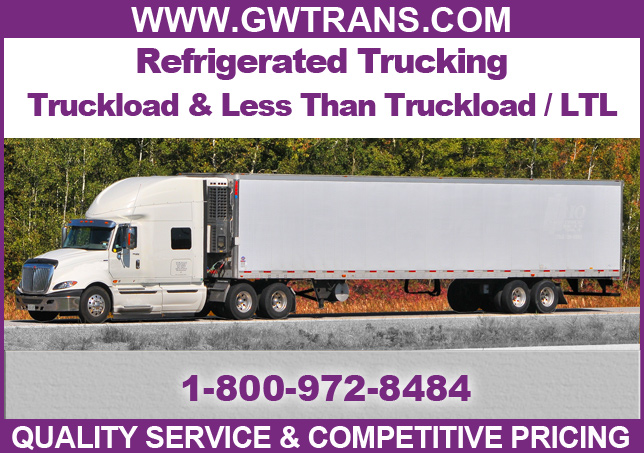
Refrigerated shippers have a great selection of companies throughout the United States that offer refrigerated trucking services. When searching for the best refrigerated trucking company for your shipping requirements you will discover that prices fluctuate due to numerous market conditions and other factors that may not be immediately obvious.
The most basic service level agreement that a refrigerated trucking company has to honor, is to provide guaranteed scheduled pick-up and on-time delivery of your freight.
Understanding any additional costs or fees that may be incurred is also important to consider. Do not hesitate to clarify all fees and charges. Unforeseen charges that were not allocated in your budget will have an impact on your business.
Inquire if there are any insurance requirements and what type of coverage is included. Additional insurance is primarily for freight that is of high value and the replacement cost would be very high. Additional insurance for freight is evaluated on a case-by-case basis.
You as a shipper will have to understand any packaging and labeling requirements for the refrigerated freight being shipped. This way, you will be able to communicate properly with the trucking company in terms of freight handling and temperature requirements during transit.
Generally the factors outlined below should be reviewed in order to make your overall experience more manageable and rewarding. When you as the shipper understand these factors, the refrigerated freight carrier will provide you with the best service and effort to deliver your business commodities.
Refrigerated Freight Cost
Refrigerated transport is inherently more expensive than standard dry van transport. This is due to the refrigeration unit operation that is needed by the refrigerated trailer, which results in higher fuel consumption and maintenance costs. Refrigerated shipping quotes will fluctuate for any number of reasons, thus it is always important to stay current with market prices.
Possible additional charges that you should confirm and inquire about may include: unloading costs, waiting fees and multiple stop charges. Discussing these additional fees from the start is the best choice. These fees are sometimes referred to as assessorial fees and are common to the overall trucking industry.
Delivery Schedule
Understanding a refrigerated freight carriers schedule and routes will help you as the shipper in your shipment planning. Plus, it will allow you to avoid any business delays or scheduling issues.
Trailer Refrigeration Equipment
The topic of trailer refrigeration equipment comes into question if there is a need to transport two separate types of freight, in the same trailer. And each type of freight will require its own temperature zone.
Many of the refrigerated trailers on the road today are capable of multi-temperature refrigeration in the one trailer. From a shippers view you simply have two compartments in one trailer and each compartment has its own temperature regulation.
The multi-temperature system utilizes two or more evaporators operating from the same power source; movable partitions in the trailer are used to create compartments for hauling up to three types of refrigerated freight, each with precise temperature requirements.
Refrigerated trailers now include extensive temperature warning systems. Current technology consists of a gauge mounted on the tractor’s dashboard to display the trailer’s temperature, and indicate any changes that may have occurred. This display enables the driver to identify when and where problems may be occurring. Some systems for example have built-in alarm codes to notify the truck driver of a problem that is going to occur. Once notified, the driver is able to correct the issue, taking measures such as employing a high-speed pull-down that can quickly lower the trailer’s temperature. Once the temperature has reached a certain level for a prolonged amount of time there is possibility of permanent damage to the freight. Thus all temperature deviations must be anticipated and simply not allowed to occur.
Customer Service and Satisfaction
Freight shippers will appreciate a trucking company with an effective customer service system in place. A great trucking company will strive to provide continuous and consistent customer support to all their shipping clients. Communication and follow-up with the shipping client are key components in the customer quality service realm. There are refrigerated transport trucking companies that are very large, but this does not mean that their service is the best. Smaller refrigerated trucking companies always have the ability and capacity to provide excellent customer service and shipment follow-up.
Refrigerated Shipment Preparations
Choosing Appropriate Packaging
Before any shipping is done, the issue of packaging requirements has to be addressed. Following packaging best practices maximizes your shipping capacity and protects your perishable commodities during shipment.
Planning Your Food Shipment
All food must be shipped in a “food grade trailer” whether it is perishable or not.
Frozen food or chilled food will require the use of a food grade trailer and proper packaging. Once food is packaged properly it is time to select a refrigerated trailer temperature type for your shipment.
Food that needs to be refrigerated or frozen will need to be shipped in a reefer (a common nickname for a refrigerated trailer). When shipping food with specific temperature requirements make sure to mark the packaging or pallet accordingly (E.g. KEEP REFRIGERATED or DO NOT FREEZE). The bill of lading will note the exact temperature range that must be kept within.
Know Where Your Food is Traveling Through
When shipping, you need to make sure you know what part of the country your food will be traveling. If your shipment cannot freeze, but will be traveling to Montana in January, special precautions may be needed to protect from freezing.
Food Grade Trailers Explained
A food grade trailer is any trailer that meets the FDA requirements for food shipment. Here are some of the specifications of a food grade trailer:
- Trailer cannot have any punctures in the ceiling, floor or wall.
- If the trailer was used to transport any type of hazardous substance, it cannot be used for food.
- The trailer may not have any debris from prior loads.
- The trailer must be dry and properly ventilated.
In official terms here are the requirements:
“The ability to maintain product temperature is affected by the condition of the transit vehicle. Intact side walls and insulation; clean floors and drains; refrigeration units that are properly serviced, maintained, and calibrated; intact air-delivery chutes; and tight, undamaged doors and seals are all essential.” Quoted from the FDA.gov website
If any of these requirements are not met the trailer can no longer be considered a “food grade trailer” and cannot be used to ship food.
Loading for Maximum Efficiency
When loading a trailer your goal is to load as much product as possible without violating any weight restrictions or exceeding maximum weight limits. The weight requirements for each state vary and the Department of Transportation (DOT) of each state issues the state specific restrictions on weight limits.
Refrigerated Transport and HACCP, C-TPAT, PIP, CSA/FAST
Hazard Analysis and Critical Control Point (HACCP) is an FDA-approved system of quality control designed to safeguard against improperly handled food. Refrigerated trucking companies who transport consumable goods are HACCP accredited. Shippers of refrigerated freight should already be aware of this. Meat and poultry distribution safety and sanitation are the responsibility of the USDA’s Food Safety & Inspection Service.
The Customs-Trade Partnership Against Terrorism (C-TPAT) was launched by the U.S. customs and border protection with the objective to protect the import supply chain management and operation. Refrigerated transport companies that provide services to import companies of refrigerated goods are eligible to join C-TPAT.
Refrigerated transport companies may also apply for Partners in Protection (PIP) certification that was designed to involve cooperation of private industry to protect border security. There is also the Free and Secure Trade (FAST) certification, a program made for the safety and security between U.S. and Canada.
Refrigerated Less Than Truckload
If you are shipping a smaller volume of freight, which would not require the capacity of a full trailer, the solution will be less-than-truckload refrigerated freight carrier services. Most of the time what defines an LTL shipment, is a weight of between 151 and 20,000 lbs. The refrigerated freight representative at Great Western Transportation will be able to determine quickly if a refrigerated LTL solution is the best choice for your shipment.





